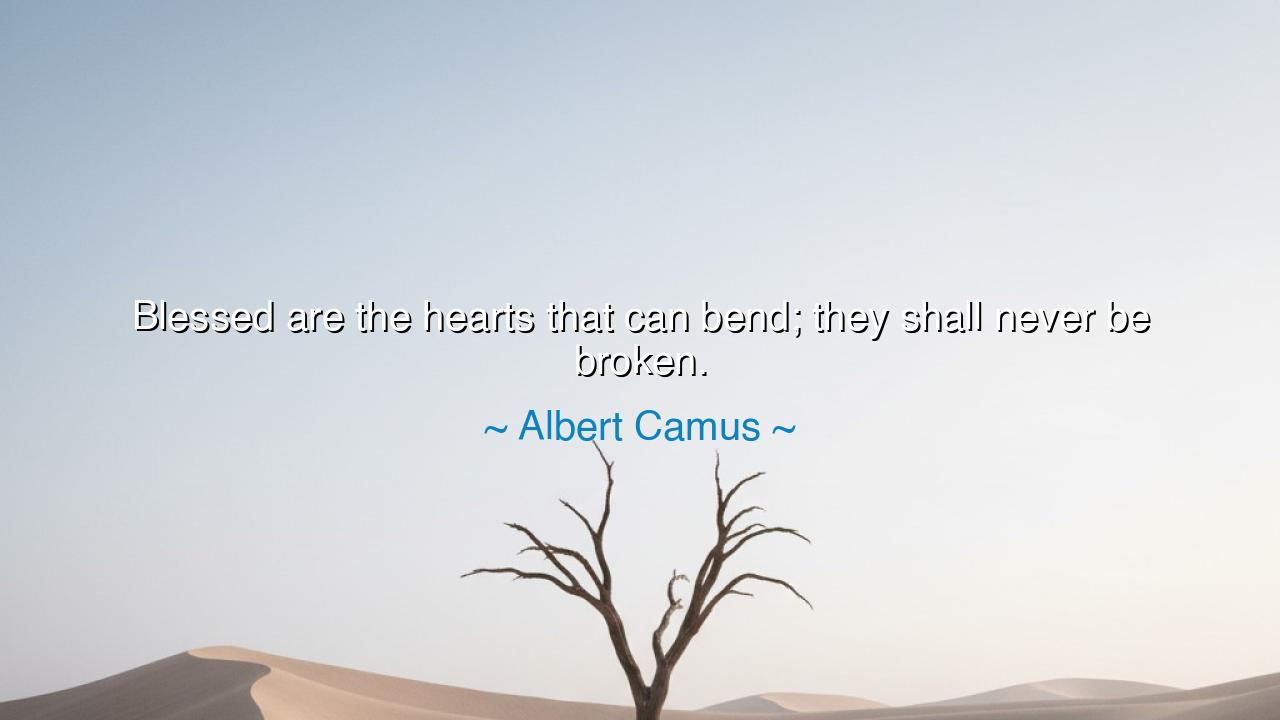
Blessed are the hearts that can bend; they shall never be






“Blessed are the hearts that can bend; they shall never be broken.” So wrote Albert Camus, the philosopher of resilience and revolt, whose words shine like a torch in the darkness of human suffering. In this wisdom is revealed a paradox: the strongest hearts are not those made of iron, but those supple as the willow. To bend is to endure, to adapt, to yield without surrender. The heart that can bow in sorrow yet rise again in hope is the heart that remains unbroken.
The ancients, too, knew this truth. They told us that the oak, mighty in its pride, shatters in the storm, while the reed, pliant and bending, survives the tempest. In the East, sages praised water as the softest yet strongest of things—it yields to all, yet in time wears down mountains. Camus, standing amid the ruins of war and the silence of despair, gave this ancient image new life: the blessed heart is not rigid, but pliable; not unyielding, but resilient.
Consider the life of Nelson Mandela. Imprisoned for twenty-seven years, he endured humiliation, labor, and the attempt to crush his spirit. Had his heart been hard with hatred, it would have shattered under the weight of bitterness. But he chose to bend—to adapt, to forgive, to endure with patience. When he was freed, he was not broken; he was stronger, for his flexibility had preserved him. His heart was blessed, not because it resisted all blows, but because it learned to yield where needed and to stand where it mattered.
So too in the story of Anne Frank, a young girl hidden in the shadows of oppression. In her diary, she wrote not words of despair, but words of hope and love. Though surrounded by fear and cruelty, she let her heart bend—facing darkness, yet finding light within herself. Though her life was tragically cut short, her spirit was never broken, and her words continue to inspire countless souls. Her legacy is proof of Camus’s wisdom: the heart that bends cannot be destroyed, even by death.
O children of tomorrow, learn this: the world will bring sorrow, betrayal, and trial. If your heart is hardened, it will crack under pressure. But if it can bend, if it can weep, forgive, and adapt, it will endure. To bend is not weakness, but the greatest strength. For it means you can carry sorrow without being crushed, you can face change without being destroyed, you can walk through storms and still emerge whole.
The lesson is plain: cultivate the art of bending. Practically, let each person do this: when faced with hardship, do not resist with pride alone—allow yourself to yield, to adapt, to be patient. When wronged, let forgiveness soften your heart, for hardness will only poison you. When life changes, bend to it as the reed bends to the wind, trusting that this flexibility preserves your core. Practice gentleness, humility, and compassion, for these are the ways the heart bends without breaking.
Thus remember Camus’s words: “Blessed are the hearts that can bend; they shall never be broken.” Carry them with you as a shield of wisdom. For the world praises hardness, yet it is flexibility that endures. And those who learn to bend with life’s storms will live long, not merely in years, but in spirit—unbroken, unbowed, and blessed.






AAdministratorAdministrator
Welcome, honored guests. Please leave a comment, we will respond soon